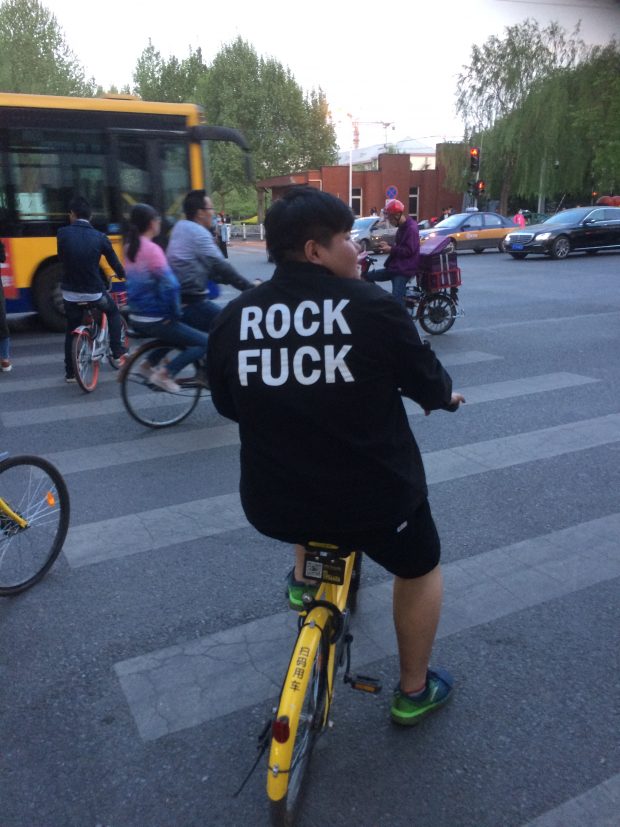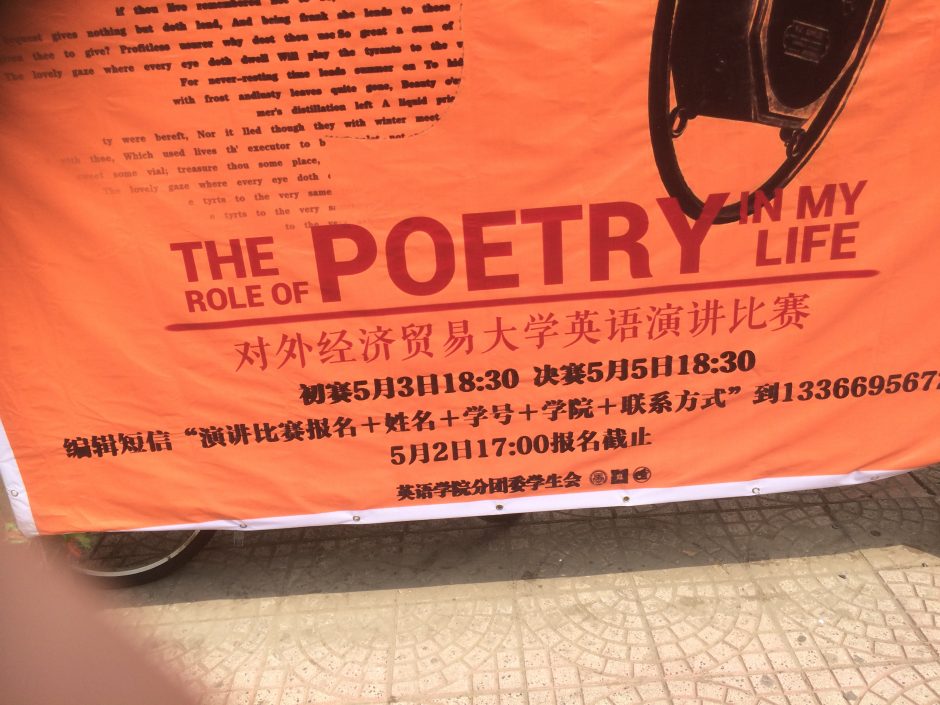Inside-out or outside-in?
by David Musgrave
In May I had the good fortune to be invited to the 4th China-Australia Literary Forum in Guangzhou. There I met four Chinese poets: Yang Ke, whose work I was already familiar with through Simon Patton’s translations, Xi Chuan, Professor at Beijing Normal University, Huang Lihai, a Guangzhou-based poet published by Kit Kelen’s Flying Islands Books (feed birds rainbows, 2014) and Zheng Xiaoqiong, who I’ll talk about first[1]. The poetry panel, which was chaired by Xi Chuan, and also featured Yang Ke, Kate Fagan, and Zheng Xiaoqiong, consisted of each poet reading a brief paper about their work or about the work of another poet that interested them. Zheng Xiaoqiong was born in 1980 in Sichuan Province but, according to her biography ‘in 2001 went south to become a peasant worker in Guangdong Province’. Here’s the way she opened:
“The starving stomach swallowed a speeding train” (Stomach). These were the words I used many years ago to describe the relation between poetry and our times. I’ve always felt that poetry has a gigantic stomach able to digest rubber, coal and uranium the same way it can digest the moon, an insect or stray birds. In this sense, it’s just like a factory machine which “feeds on iron and diagrams/ Starlight, dewdrop, salty sweat, it keeps picking its teeth/ Spitting profits, banknotes and alcohol.”[2]
Hearing Zheng read this was like hearing a bunger go off in a library. I felt immediately that here was poet whose wavelength I was on, or at least whose wavelength I would like to attune to: straightforward, energetic, original, wild. The energy of her paper, later reflected in the poetry she read at Jinan University seemed to me in direct relation to the enormous transformations that had occurred in Chinese language, culture and society since the late 1970s, not the least of which has been the rural-urban migration of the last thirty years or so, which is the largest in human history[3] – and here was a poet whose life is congruent with that amazing trajectory.
The first poem in her book, titled ‘A Child Migrant Worker from Cold Mountain’ focuses on a fourteen-year-old girl who leads the narrator and other workers on a factory assembly line. The environment is brutal – ‘why is the only little compassion also shattered by machines’ – evidenced by the contempt the group leader shows for a co-worker in the final two lines of the poem:
She points at another girl thinner and more delicate than she saying
“She is younger than I am but she has to sleep with men at night.”
 Many of Zheng’s poems are proletariat in theme and critical of the dehumanising aspects of factory work, prostitution, the massive dislocation of leaving home to seek work in the city, an environment dominated by machines. It put me in mind, in a strange way, of poetry from the English industrialization: Blake’s ‘London’, Goldsmith’s ‘The Deserted Village’, among others, but Zheng’s poetry views the rural-urban mass migration and massive industrialization from the inside out, rather from the outside in. It also made me think of two conversations I had over twenty years ago: one, with an Australian writer I once knew who wanted to become an American novelist because Australian literature was so dull and dreary – at least America had had a civil war, I think was the reasoning; the other, with a philosopher who believed that ‘great’ art could only come out of great social upheaval. I wonder whether each would stand by their comments today: I suspect not, but you never know. Compared to the transformation that has occurred in the last forty years or so in China, Australia might appear to be a tad dull, but such comparisons are themselves dull, as energy is to be found in specificity, originality in point of view, wildness in imaginative engagement, and these combinations can be found anywhere and everywhere. What is worth repeating, though, is a comment made by a professor from Shanghai University of International Business and Economics, who told me that Australian Literature and Chinese literature had much in common, as both were relatively ignored or trivialised on the world stage. It may be that he is right: the one we can only glimpse from outside because of the difficulty of the language for non-Mandarin speakers and reliance on translation; the other, for English speakers, in competition with the USA, Canada, the UK and India but still subject to a kind of economic imperialism as far as book publication goes (it’s hard to think of an Australian publisher, Rupert Murdoch aside, who goes against the trend of multi-national book imports to Australia and exports to those markets). Of course, the way I just phrased that last sentence implies that the ‘world stage’ is anglophone, which is an assumption that will be challenged, along with many other things, in the coming decades. Historically, perhaps it has been, but this has only been because of how power (military, economic, intellectual property) has been deployed in the past. The next time I am told that a book I am trying to sell into the UK or US markets is too Australian, I’ll be looking elsewhere. Issues of translation notwithstanding, there is significant interest in Australia and Australian literature in China. While the readership of literature in China is small it is still a substantial potential market for Australian literature. At Puncher & Wattmann, I’m seeking to publish a translation of Contemporary Australian Poetry in China in the next year, as well as establish a series of bilingual editions of Australian and Chinese poets, among other projects, to be co-published in China and Australia.
Many of Zheng’s poems are proletariat in theme and critical of the dehumanising aspects of factory work, prostitution, the massive dislocation of leaving home to seek work in the city, an environment dominated by machines. It put me in mind, in a strange way, of poetry from the English industrialization: Blake’s ‘London’, Goldsmith’s ‘The Deserted Village’, among others, but Zheng’s poetry views the rural-urban mass migration and massive industrialization from the inside out, rather from the outside in. It also made me think of two conversations I had over twenty years ago: one, with an Australian writer I once knew who wanted to become an American novelist because Australian literature was so dull and dreary – at least America had had a civil war, I think was the reasoning; the other, with a philosopher who believed that ‘great’ art could only come out of great social upheaval. I wonder whether each would stand by their comments today: I suspect not, but you never know. Compared to the transformation that has occurred in the last forty years or so in China, Australia might appear to be a tad dull, but such comparisons are themselves dull, as energy is to be found in specificity, originality in point of view, wildness in imaginative engagement, and these combinations can be found anywhere and everywhere. What is worth repeating, though, is a comment made by a professor from Shanghai University of International Business and Economics, who told me that Australian Literature and Chinese literature had much in common, as both were relatively ignored or trivialised on the world stage. It may be that he is right: the one we can only glimpse from outside because of the difficulty of the language for non-Mandarin speakers and reliance on translation; the other, for English speakers, in competition with the USA, Canada, the UK and India but still subject to a kind of economic imperialism as far as book publication goes (it’s hard to think of an Australian publisher, Rupert Murdoch aside, who goes against the trend of multi-national book imports to Australia and exports to those markets). Of course, the way I just phrased that last sentence implies that the ‘world stage’ is anglophone, which is an assumption that will be challenged, along with many other things, in the coming decades. Historically, perhaps it has been, but this has only been because of how power (military, economic, intellectual property) has been deployed in the past. The next time I am told that a book I am trying to sell into the UK or US markets is too Australian, I’ll be looking elsewhere. Issues of translation notwithstanding, there is significant interest in Australia and Australian literature in China. While the readership of literature in China is small it is still a substantial potential market for Australian literature. At Puncher & Wattmann, I’m seeking to publish a translation of Contemporary Australian Poetry in China in the next year, as well as establish a series of bilingual editions of Australian and Chinese poets, among other projects, to be co-published in China and Australia.
[1] Zheng Xiaoqiong’s collection is bilingual with no ISBN, seesm to have been published by “works’ magazine, 552 Longkouxi Road, Tianhe District, Guangzhou, Guangdong China.
[2] Zheng’s paper will be published in a ‘Speech Collection’ to be published by the China Writers Association in association with the Guangdong Provincial Writers Association and the Writing and Research Centre of Western Sydney University – I have no more information beyond that – the copy I have was in the forum material for the delegates, and the aforementioned organisations organised the forum in Guangzhou from May 7 – 11 at the Guangdong Guest Hotel in Guangzhou.
[3] The source for internal immigration is “Labour migration”. International Labour Organization. Retrieved 2013-10-20.
Photo credits: David Musgrave 2017

